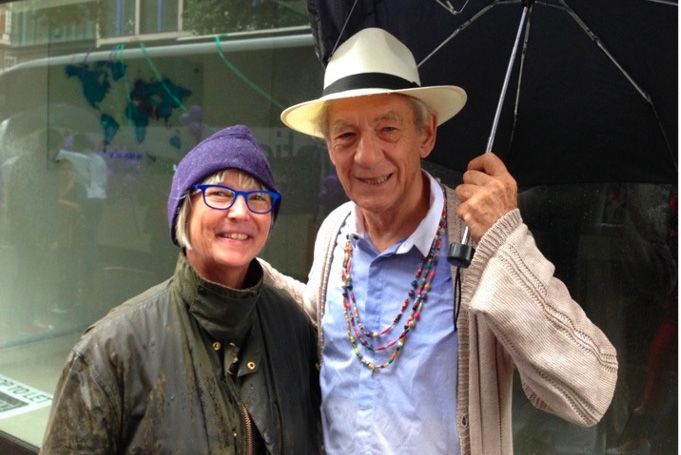Brands risk slipping back into the closet of shameful silence

Opinion
Pride Month reminds us of the progress LGBTIQ+ has made in media and marketing. But brands are increasingly regarded as fair play in a battle to control the narrative of what is decent.
The beaming face of Miriam Margolyes naked and grinning behind strategically placed iced buns summed up in one glorious photograph how to make a big point.
“Gay people are very lucky because we are not conventional,” she declares. “I’ve never had any shame about being gay or anything really. I knew it wasn’t criminal because it was me. I couldn’t be criminal.”
Described in the Vogue interview‘s headline as “our naughtiest national treasure”, the whole thing opened floodgates of joy and relief for me. This wonderful, funny, and accomplished lesbian as out and proud as it is possible to be.
Once again Vogue Britain has demonstrated the power of inclusion and acceptance with wit and a distinctive flourish at a time when brands are being made to feel increasingly queasy about celebrating Pride. Miriam sums up what this time of year is all about. “It’s a strong position if you’re not afraid to be who you are,” she says. “We’re all so insecure. People are frightened such a lot of the time and what I’ve always tried to do is to make people feel more relaxed, make people feel good about themselves and just try to lessen the torture for people a bit.”
I was late to the party, or the protest, when it comes to Pride. I first marched alongside Sir Ian McKellen, one of the founders of Stonewall, in the pouring rain of London in June 2014. Earlier that day he had spoken to 200 young people about how much things had changed since 1989 when he co-founded Stonewall. Most of them attending for the very first time, they had come from across the UK, and were being chaperoned by Stonewall staff. Sir Ian recalled that Stonewall had wanted to establish legal and social equality. “We have to achieve a country where everybody can feel safe to be out, and everyone else respects them for it.”
By March 2014 the first same sex marriages had taken place, later that year Conchita Wurst won Eurovision, and a record number of organisations from the public and private sector were assembled to take part in Pride in London. Sir Ian celebrated the fact that 2014 would be the first time his own union Equity would be marching and said that there would still be those watching from the sidelines, afraid to be out, who would take heart from our presence.
As I sat having tea with him afterwards, I arranged the delivery of one of Stonewall’s distinctive red T-shirts with the slogan “Some people are gay. Get over it” printed in Russian so he could wear it when he spoke later on the main stage in Trafalgar Square. I remember the strong feeling that we had truly reached a new and irrevocable era of acceptance and celebration and the work now was to make what we experienced on that heady day a reality for every LGBTIQ+ person, every day, across the UK and the rest of the world.
Some people are trying to turn back the clock
Here we are, less than 10 years later, and it is striking how much sentiment in so many social, political and media quarters seems to be sliding backwards. It would appear that we had rejoiced in the idea that state-sponsored persecution had been assigned to the bin of history too soon. We were so optimistic. We believed the momentum would continue, and expected further progress to be made which would safeguard the queer community from overt hate and everyday indignities.
Against this backdrop a new question being posed to marketing folk; “Do brands enjoy freedom of speech?” One would have hoped that the answer was as simple as, “Yes, as long as what they say is legal, decent, honest and truthful”.
However, worryingly, there are signs that a vocal minority have become sufficiently hostile towards LGBTIQ+ people for brands to shy away from voicing allyship and opt for silence. Brands are increasingly regarded as fair play in this battle to control the narrative of what is decent and truthful.
Oxford University recently appointed the very first chair of the history of sexualities in the country, Professor Matt Cook, who used his first media interviews to say that the government has been blowing the issue of free speech out of proportion. “I think there is some political expediency in this,” he said. “It’s a way of fanning a culture war. I don’t think we need additional protections for universities. Free speech is pretty alive and well.” I am heartened by his optimism and know there is considerable proactive effort being put into the protection of respectful academic discourse in universities.
Brands risk losing their footing if they are not alert
The use of celebrity endorsements has always carried risks and brands have been rightly careful about who they’re associated with. Until quite recently a quick way to be seen as “edgy” or appealing to younger people was to cast LGBTIQ+ folk (or show a picture of two men kissing) in your advertising. It may have got people talking but certainly didn’t lead to a backlash against the brand. We now live in times when some people are emboldened to object to this kind of casting of queer people in marketing campaigns in the strongest terms. Ranging from hostility directed towards them on social media to commercially damaging consumer boycotts, some brands are finding that Pride isn’t just a colourful summer party.
These brands knew they were being provocative but perhaps didn’t sufficiently understand the politics. These are brands that chose to be overtly trans-inclusive but not all of them seemed ready to stand their ground when the going got tough. Most recently here in the UK, the Daily Mail reported, “DIY giant Wickes is facing a furious boycott campaign and tumbling share price after its chief operating officer said shoppers with trans-critical views are ‘bigots’ who ‘are not welcome in our stores anyway”. The COO, Fraser Longden, made the comment on a panel hosted by PinkNews and instantly Wickes became a “tall poppy” for an increasingly well-organised opposition who are leveraging the tactic of boycotts and intimidation to silence trans allyship. But they were ready. Issuing a statement which read, “we support the LGBTQ+ community in its entirety. We are committed to building a workplace and culture where all colleagues can feel at home.”
For many years, brands were criticised for potentially “pink washing” when they participated in Pride, put up rainbow flags or sold merchandise. Now that show of solidarity could bring real trouble and no doubt is leading the some to question the wisdom of such visible signs of solidarity with the LGBTIQ+ communities. At least it will if you didn’t understand that the Pride season may have looked like fun, but at its very essence was the political idea of equality and human rights, as well as joy and celebration.
Will brands come out or choose the closet?
It’s not going to be easy to stay out of the argument when we have a government and political environment that seeks to stoke culture wars. That means that both customers and employees may bring the issue to you whether you fly a Pride flag or not. Are brands free and able to say that they are happy to serve, employ and work with LGBTIQ+ individuals regardless of those customers and employees who don’t share that view?
The rainbow was chosen as a symbol to represent natural diversity and to enable LGBTIQ+ people to say they are proud to be who they are and happy to be visible. Acceptance seems like the minimal ask. When tested, I hope brands choose to embrace the joy of coming fabulously “out for LGBTIQ+ people”, as embodied by Miriam Margolyes, rather than slipping back into the closet of shameful silence.
 Jan Gooding is one of the UK’s best-known brand marketers, having worked with Aviva, BT, British Gas, Diageo and Unilever. She is now an executive coach, chair of PAMCo and Given. She writes for The Media Leader each month.
Jan Gooding is one of the UK’s best-known brand marketers, having worked with Aviva, BT, British Gas, Diageo and Unilever. She is now an executive coach, chair of PAMCo and Given. She writes for The Media Leader each month.
Career Leaders: The Media Leader‘s weekly bulletin with thought leadership, news and analysis dedicated about media careers, training, development and wellbeing.
Sign up for free to ensure you stay up to date every Tuesday.



